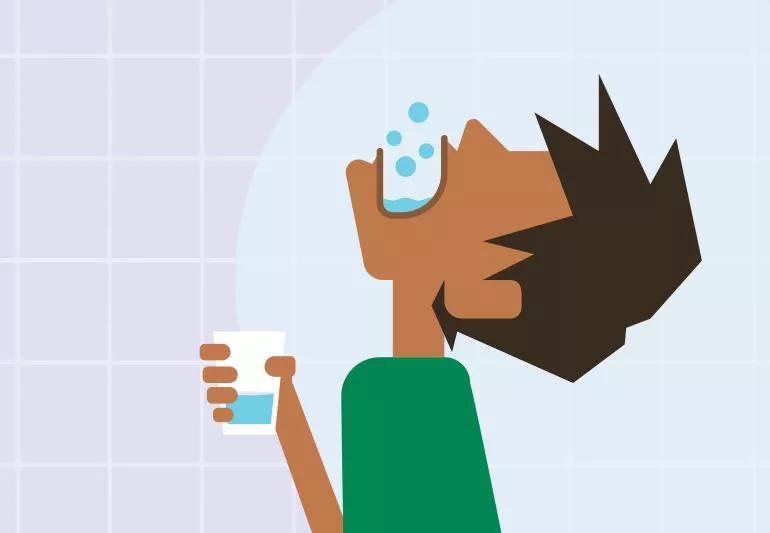Here’s five ways to cut your hiccups short

Image content: This image is available to view online.
View image online (https://assets.clevelandclinic.org/transform/9afc2f72-e3b4-4304-b2dc-9e26c3f405d6/person-Gargling-Water-1173879257-770x533-1_jpg)
Child with head back gargling water.
Most people have experienced the annoying, sometimes quite noisy condition known as hiccups. But why do they happen? And more importantly, what can you do to get rid of them?
Advertisement
Cleveland Clinic is a non-profit academic medical center. Advertising on our site helps support our mission. We do not endorse non-Cleveland Clinic products or services. Policy
Remedies for stopping hiccups are about as mysterious as hiccups themselves. While there isn’t much research that tells us how exactly to stop them, there are some natural remedies that may help.
Family medicine physician Daniel Allan, MD, explains what hiccups are and some natural ways of giving them the boot.
Centuries ago, people claimed hiccups meant a growth spurt for children. Today, we understand the mechanics of a hiccup: When your diaphragm — a muscle situated between your lungs and stomach — becomes irritated, it begins to spasm. This spasm causes what is commonly known as hiccups.
“Hiccups happen when there’s a disturbance in the nerve pathways that lead from the brain to the diaphragm,” explains Dr. Allan.
Part of remedying hiccups is knowing what might trigger them. Believe it or not, the things that can set off a series of hiccups can range from what you consume to your environment. They can be caused by things like eating too quickly, drinking carbonated beverages or even when you feel overly excited or anxious.
It’s unclear if hiccups have a physiologic role. “In the uterus, hiccups may be a programmed exercise of the lungs to help with breathing,” Dr. Allan adds.
You’ve probably heard about numerous remedies for curing hiccups, but none has any scientific basis, experts say. However, some anecdotal evidence suggests that an increase in carbon dioxide may help.
Advertisement
Here are a couple ways to halt your hiccups:
Hiccups also come with a variety of other, slightly weirder techniques that are suggested mostly by anecdotal evidence. Obviously, the success rate of these options depends on each person.
But here are some to try:
Is it your baby who’s having a bad case of the hiccups? Whether it’s gassiness or taking breaths too quickly, your newborn may run into some hiccups of their own.
Advertisement
Some simple ways to relieve your baby of hiccups include changing their feeding position, burping them more often or even giving them a binky to suck on.
The good news is that hiccups are usually short-lived.
However, if you have persistent hiccups that last for several days or more, see a doctor. This may indicate the presence of a medical issue that needs attention. “Sometimes, certain diseases or even a medical procedure, especially those involving anesthesia, can cause prolonged bouts of hiccups,” Dr. Allan notes.
But it’s more common for hiccups to go away on their own. If you don’t want to wait them out, give these tips a try!
Advertisement

Delivered every Tuesday!
Sign up for our Health Essentials emails for expert guidance on nutrition, fitness, sleep, skin care and more
It's a letter about the news!

Every two weeks once
Sign up for our Health Essentials emails for expert guidance on nutrition, fitness, sleep, skin care and more.
Learn more about our editorial process.
Advertisement
For some lucky people, these pillows can eliminate the need for medications or surgery
Lifestyle changes such as diet and weight loss or medication such as antacids can bring relief
Mix up your regular cup, with these low-acid options
The short answer from a gastroenterologist
Regular regurgitation can be common for infants
The Short Answer from a gastroenterologist
There’s not enough research to know, but it’s OK to try it for most
A different formula may help babies with gas or other digestive problems — find out which one may be best for your baby.
Type 2 diabetes isn’t inevitable with these dietary changes
Applying a hot or cold compress can help with pain
Pump up your iron intake with foods like tuna, tofu and turkey